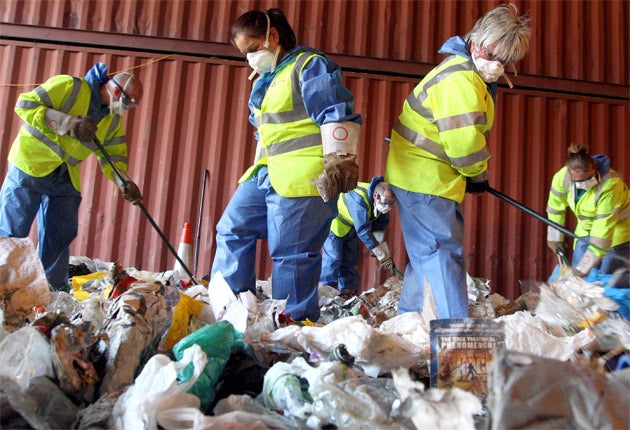How a cargo of rubbish became a crime scene that shames Britain
Cahal Milmo joins investigators examining a consignment of domestic waste illegally exported as recyclable plastic

Your support helps us to tell the story
From reproductive rights to climate change to Big Tech, The Independent is on the ground when the story is developing. Whether it's investigating the financials of Elon Musk's pro-Trump PAC or producing our latest documentary, 'The A Word', which shines a light on the American women fighting for reproductive rights, we know how important it is to parse out the facts from the messaging.
At such a critical moment in US history, we need reporters on the ground. Your donation allows us to keep sending journalists to speak to both sides of the story.
The Independent is trusted by Americans across the entire political spectrum. And unlike many other quality news outlets, we choose not to lock Americans out of our reporting and analysis with paywalls. We believe quality journalism should be available to everyone, paid for by those who can afford it.
Your support makes all the difference.In a secret compound in Britain's busiest dockyard, an unusual crime scene was unfolding yesterday. Amid a cloying stench of putrefying waste, investigators clad in face masks and forensic suits picked out the evidence they were seeking from a 500kg bale of compacted rubbish: a soiled nappy, a bag of rotting meat, rusting soup tins and a pair of knickers.
The fetid detritus was one of roughly 4,000 bales held in shipping containers in the port of Felixstowe which are at the heart of the investigation into how a huge quantity of municipal waste was exported from Britain to Brazil under the guise of recyclable plastic.
The discovery of 2,000 tons of British rubbish in three Brazilian ports this summer caused a diplomatic incident and the hurried repatriation of the material to the Suffolk port, where the Environment Agency (EA) yesterday confirmed that its investigators had discovered copious quantities of illegally-exported waste.
The first 91 of more than 100 containers exported from Britain by two Swindon-based recycling firms arrived back in Felixstowe last month after customs officials in Brazil said they had found hazardous material, including hospital waste, and demanded that Britain take it back.
Working in an improvised warehouse fashioned from vast stacked shipping containers in an undisclosed location, a team of investigators from the EA has now begun the task of sorting through the decaying rubbish for evidence that laws banning the export of municipal waste have been flouted.
The result is a litany of decaying household goods which travelled 7,000 miles from Britain's domestic rubbish bins to Brazilian ports, where shipping manifests identifying the cargo as high-value "scrap plastic" were instead found to conceal low-grade waste collected from across southern England that should have been destined for landfill. So far, just one bale of recyclable plastic has been found in the containers.
Although there is a legitimate and lucrative trade between the West and developing countries in clean recyclable plastics such as drinks bottles, it is illegal to export waste for disposal under the Basel Convention – the international treaty signed by Britain which aims to prevent wealthy countries dumping hazardous rubbish on the third world. It is estimated that at least one million tons of waste is illegally exported out of Britain each year by criminal gangs wanting to avoid paying a landfill tax of £40 per ton of rubbish.
Ploughing systematically through each 20m-long cargo container, the investigators in Felixstowe have the task of cutting open each half-ton bale of rubbish and shovelling through a mass of sodden plastic bags, cardboard and newspaper to extract items which are placed in evidence bags and carefully logged on video cameras. Andrew Higham, head of the EA's recently-established national environment crime unit, said: "Waste in this state is clearly not suitable for recycling and should never have been exported. This is completely unacceptable and we will not allow this type of waste to be sent to developing countries."
The waste now stacked amid the cargo container canyons of Britain's busiest port arrived in Brazil between February and May this year after being sent across the Atlantic by Worldwide Biorecyclables Ltd and UK Multiplas Ltd, two waste contractors set up by Brazilian nationals in Swindon in 2007. Worldwide had contracts to recycle plastic waste with Swindon Council and Wiltshire County Council, although neither local authority provided the company with waste.
Among the items already found are nappies, which are being tested for e-coli contamination, cat food pouches, rusting tin cans, syringes, used underwear, rotten food and part of a car dashboard. Medical waste such as used blood bags and out-of-date medication which was found in Brazil has not been discovered but just 12 of the 91 containers have so far been opened. A further ten containers, including those examined by Brazilian officials, will arrive in Felixstowe later this month.
With the inquiry taking place under the glare of international publicity generated by complaints from Brazil's president Luiz Inacio Lula da Silva that Britain was treating his country as "the world's rubbish bin", investigators are at pains to point out their determination to find the source of the rubbish.
Three Brazilian nationals who were arrested in connection with the exported waste remain on police bail. Mr Higham said that his officers were "looking at other people" and further arrests could not be ruled out. In the meantime, his investigators must continue ploughing through the Brazilian cargo at a rate of 2.5 containers a day. Even by opening just a selection of the 40 bales inside each fumigated container, it will take another eight weeks to complete the task.
Join our commenting forum
Join thought-provoking conversations, follow other Independent readers and see their replies
Comments